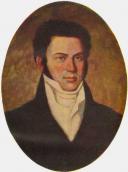Kotliarevsky Ivan
Ivan Petrovich Kotliarevsky (August 29 (September 9) 1769 – October 29 (November 10) 1838) – Ukrainian poet and playwright.
He was born in Poltava in the family of clerk. With Poltava connected most of his life. In 1780 – 1789 he attended the Poltava seminary; in 1789 – 1794 served in office, in 1794 – 1796 years had been a teacher in the master's estate, in 1796 – 1808 years was in military service and fought in the war against Turkey in 1806 year.
After his retirement in 1808, Kotliarevsky unsuccessfully tried to find a service in St. Petersburg. In 1810 – 1835 years he again served in Poltava in various educational and charitable institutions. He died in 1838, buried in Poltava (his grave is still carefully preserved).
Kotliarevsky's literary heritage quantitatively very small. Central place in it occupied by "Aeneid" – burlesque processed poem of the same name by Virgil. Kotliarevsky-playwright issued two small comedies – "Natalka POltavka" and " Moskal magician".
Value of Kotliarevsky in the history of Ukrainian literature is very large. It is quite justly considered a pioneer of modern Ukrainian literature, which began to develop on the basis of national spoken language. Therefore rightly year 1798, when was published first, yet imperfect version of "Aeneid", is the starting year of the new Ukrainian literature.
Shevchenko and Kotliarevsky
1. They were not familiar with each other – either in person or letter.
2. In 1838, Shevchenko responded to the Kotliarevsky's death with poem "In everlasting memory of Kotliarevsky", where highly praised achievements of the late poet.
3. In 1845, while in Poltava Shevchenko drawed Kotliarevsky's dwelling against the background of the Assumption Cathedral.
4. In the preface to "Kobzar", written in 1847, Shevchenko assessed the state of contemporary Ukrainian literature. One paragraph devoted to "Aeneid", rating which was more restrained.
5. In 1853 in the story "Maidservant" Shevchenko compared his Lukia with Venus-sutler from the "Aeneid." Quotes he made from memory so they approximate.
6. In 1855 in the story "Gemini" Shevchenko by mouth of his character – Nicephorus Sokyra – expressed a critical attitude towards Kotliarevsky's panegyric in honor of Alexei Kurakin. This "Song" was first published in 1849 in Lviv; this publication Shevchenko probably did not know; he knew about it from the manuscript tradition.
7. In the same story "Gemini" Kotliarevsky shown as an effective person, trustee of Poltava gymnasium.
8. Another quote from "Aeneid" was given in the story "The Artist" (1856).
9. Researchers believe that Kotliarevsky's creativity had some influence on Shevchenko. The most transparent way this relationship can be traced between the plays "" and "Nazar Stodolja".
All works of Kotliarevsky online on the "" site.
M. Zh., September 22, 2014.

